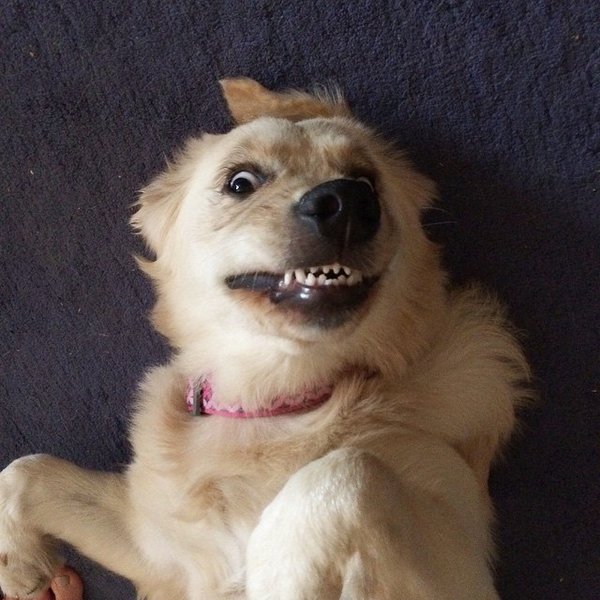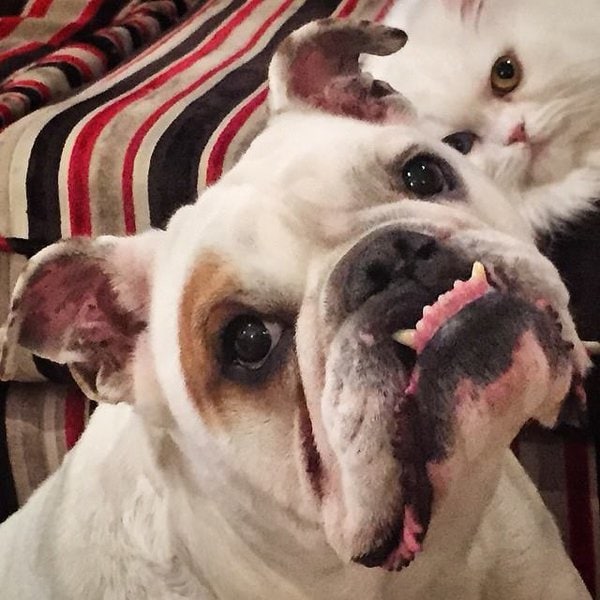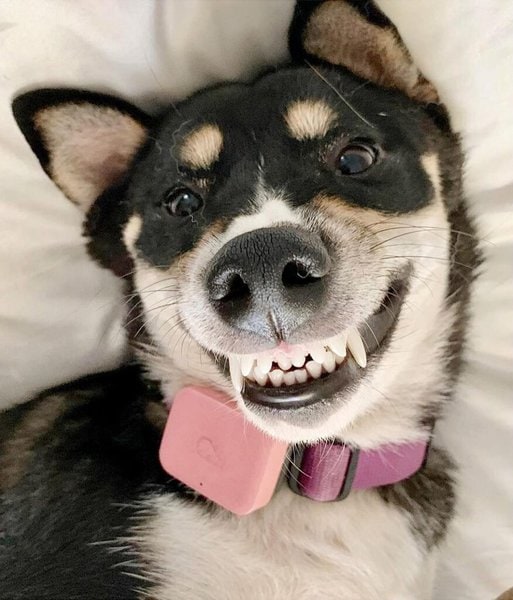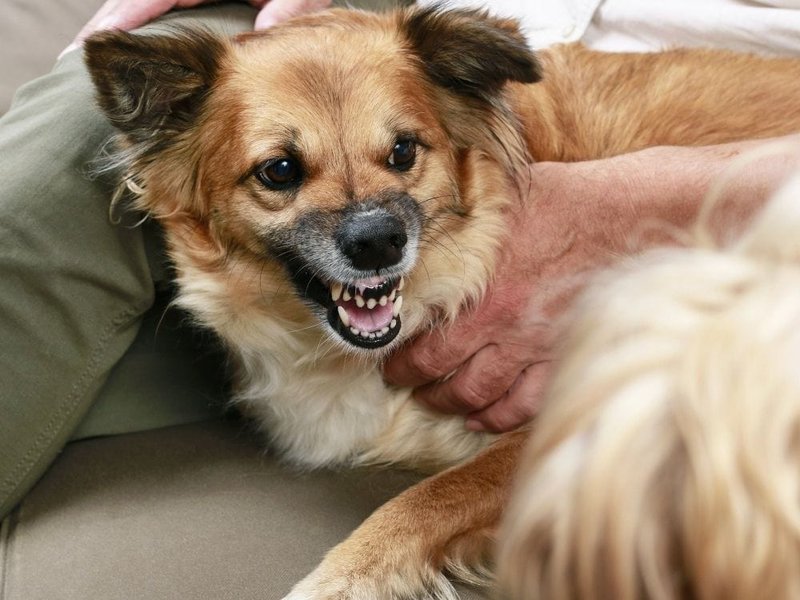Dogs growl to make their feelings known, but how can you understand what your pooch is trying to say? Read on to find out about the different types of dog growls and what they mean.
What is a dog growl? A growl is a low, guttural sound produced by dogs as a means of communicating with people or other animals. Dogs typically communicate by growling when attempts to make their feelings known with body language are not successful.
A growl is usually the first obvious sign of aggression in a doggie, but it can mean a whole lot of other things. Today’s article focuses on the reasons for growling in dogs, how to react when your dear Fido suddenly starts growling at you or your family, and how to distinguish between a playful and aggressive growl. However, before we go into all this, let’s examine the different types of dog growls and what they mean.
What Do Different Dog Growls Mean?
Dogs growl for various reasons, and it is understandable if all pooch growls sound similar to an untrained ear. As a dog owner, however, it’s important to differentiate between the various dog growls, as this will help you take the necessary and appropriate actions.
Without wasting more time, let’s take a look at some common doggie growls and what they mean:
Play Growling
Dogs growl when they want you to play with them. And it’s also common for a canine to let out short, high-pitched growls while playing tug-of-war with you or wrestling with other pooches.
Apart from the growling sounds let out by a playing pooch, you should also watch out for the following play signals to be certain that your furry friend is having fun:
- Laying down and rolling over.
- Stretching on it forelegs while its rear end is raised.
- Frantic, bouncy movements.
- Repeatedly slapping its front legs on the ground, and many more.
When play growls begin to increase in intensity though, it can be a sign that things are about to turn ugly, and you should take a play timeout to cool things down.

Frustration Growling
Another reason behind canines’ growling is to express frustration at being unable to achieve a goal or get to the desired location.
Imagine returning home from a long day at work, but you’re then separated from your pooch by a fence or barrier. A growl in this situation – usually accompanied by frantic movement – means your dog knows you’re around, but is frustrated at being unable to reach and shower you with licks.
Threat Growling
When a pooch is threatened by an object or by a person, it will growl to discourage the perceived threat from coming nearer. Doggies bite only as a last resort, and a threatening growl is to warn intruders to stay away. A threatening growl is sometimes accompanied by the doggie making an attempt to escape or barking.
Also, due to super-sharp hearing, it isn’t uncommon for dogs to growl at ‘threats’ that aren’t located in their immediate vicinity.
Pleasure Growling
It is not uncommon for pooches to give out a low growl when receiving back or belly rubs, and in this case, growling is simply an indicator that they enjoy what you’re doing and encouragement for you to continue.
Aggressive Growling
Arguably the most dangerous of all dog growls, an aggressive growl is an indicator that a doggie intends to cause harm to the object of its aggression. And it is usually accompanied by stiffening of the body, snarling and baring of teeth, plus attempts to lunge at the target.
Aggressive growls are typically loud, but they can also come in long, low rumbles.
Pain Growling
Dogs also give out low growls when in pain from either injury or an illness. A doggie in pain will typically become moody and snappy. And as a further indicator that a pooch is in pain, it’ll growl only when you poke injured parts on its body or attempt to move it.
Why Is My Dog Growling At Me All Of A Sudden?
You’ve raised a loyal doggie for years, and then, one day, out of the blue, your furry friend starts growling at you for reasons not obvious to you at the time; This can be quite a scary experience and has led to many dog owners giving out their pooches, or in extreme cases, euthanizing them.
However, most times, when a dog growls at its owner, it’s to let you know something’s wrong. And if you can identify and resolve the problem, then the growling should automatically stop.

That said, some of the reasons your dog might start growling at you all of a sudden include:
Possession Guarding
Doggies have favorite items in the home – toys, bone, food, sleeping spots – and they are typically possessive and fiercely protective of these items. A pooch’s natural instinct is to growl at anyone – owners included – approaching any of these items menacingly. And this growl is intended to tell the intruder: ‘Hey, back off! This is mine!’
Backing off will most likely stop your dog from growling and snapping at you at the time, but it will most times reinforce your pooch’s belief in boundaries. And this will only lead them to become even more protective.
Pain
Dogs can be in a lot of pain and not show any of it. And when you, unaware of this pain, carelessly try to move your furry friend away from the entrance to your room, you will elicit a painful growl from your pooch.
Fear And Anxiety
When a doggie is scared or bothered by something, it typically displays these emotions by growling – even at its owner. Actions such as suddenly putting your face near your dog’s, or hugging and kissing your furry friend may unexpectedly be perceived as a threat, and cause an otherwise loving pooch to growl at you.
Sometimes, The Growl Might Not Even Be For You!
If your pooch sleeps on the same bed with you, it’s possible you have heard it growling at you in the night. Rest easy though! This growl might be an involuntary result of your pooch dreaming or relieving a memory.
Why Has My Dog Started Growling At Family?
Resource Guarding
Remember how we stated earlier how pooches are protective of their favorite items in the home? Well, this also includes humans.
And if you happen to be your doggie’s favorite person, it’ll most likely become anxious and growl when other family members move close to you.

Fear
Another reason your dog can suddenly start growling at your son or other family members is that it’s scared of them. And this can occur as a result of your son punishing or yelling at your furry friend whenever you’re away.
Consequently, your dog will growl in fear and anticipation of possible punishment whenever your son or the guilty family member approaches it.
If you notice growling at a family member by your Fido, investigate and find out what happens while you’re away. However, while taking inventory of the situation, it might be necessary to use muzzles on your pooch, or even prevent contact with the family member your dog growls at.
Territorial Behavior
Dogs are highly territorial by nature and, as a warning, will growl at you or any family member encroaching on their perceived territories in the home.
For instance, if you have a dog that shares a bed with you and your husband, the pooch can occasionally growl at your husband if it feels he’s encroaching on his bed space.
Major Changes in the Household
Recent changes in the home such as bringing in a new baby, the introduction of a new pet, or moving to a new house might also really upset a pooch and cause it to growl at family members.
What To Do If A Dog Starts Growling At You?
Visit Your Vet
Immediately you notice your pooch growling, the first and responsible thing to do is to book an appointment with your vet doctor. For no reason should you attempt to treat a growling pooch without proper diagnosis, you may only make things considerably worse for your furry friend.
With proper medication and treatment, your pooch’s pain will be alleviated, and growling will lessen considerably. However, if your vet rules out a medical condition as the source of your dog’s growling, then you should consider any of the other steps listed below:
Keep Your Dog Away From Triggers
If your pooch starts growling at you or family members, carefully access the situation and the environment, and find out the reason for the growling. By doing this, you will, most times, find out the reason for your pooch’s sudden aggression, and can then think of and implement suitable solutions.
Proper Socialization
Growling in dogs can be reduced considerably if your furry friend is properly socialized from a young age.
- Regularly take your pooch on walks to dog park to enable it to mingle and get familiar with other dogs.
- Regularly grooming your dog as a pup will teach it to be more comfortable with hair brushing and nail clipping as an adult.
- Introduce your pup to different types of people, objects and situations at a controlled pace. It can also help to associate some of these people and situations with treats and rewards.
Training
If your pooch’s growling is getting out of hand, you should employ the services of a dog trainer or behaviorist to professionally analyze the situation, and determine the next cause of action.
If the reason your doggie growls are certain triggers, the trainer will teach your pooch to live with and stop growling at these triggers using positive reinforcement.
You Can Never Go Wrong With A Treat
Another way you can calm down an angry dog is by offering specially formulated dog chews designed to provide anxiety relief like the GOODGROWLIES Calming Hemp Treats for Dogs. The tasty GOODGROWLIES treat contains natural ingredients such as valerian extracts and hemp oil that have been proven to keep dogs calm during stressful situations.
As an alternative to dog treats containing hemp oil, you can buy the ADAPTIL Calming Collar to calm a growling dog. This collar works by continuously releasing pheromones which have a calming effect on frightened or stressed pups.
What You Shouldn’t Do If Your Dog Growls At You
You should never punish a dog for growling. By punishing a growling doggie, you’re only encouraging it to skip the growl and find other means to communicate its feelings. And you should know that this new method of communication might come in the form of a snarl or a bite!
You also shouldn’t ignore growling by dogs, as it is only a precursor to a more serious problem. By paying attention to, and listening to your pooch, you can learn what the problem is and avert potential disaster.
Is My Dog Playing Or Being Aggressive With Me?
As stated earlier, dogs growl when they are playing and having fun or as a sign of aggression. And without proper knowledge and training, it can be really tricky to determine from just the growls, whether or not your pooch is simply having the time of its life or gearing up to launch an assault.
How To Identify An Aggressive Dog?
In addition to growling, there are some telltale signs to know when your pooch is being aggressive and when a dog fight is about to turn serious. Some of the observable signs of aggression in canines include:
- Reduction in bouncy, exaggerated movements. Instead, your pooch will take careful, calculated steps.
- A fixed stare.
- Look to the tail – a stiff, upright tail is a sure-fire way to tell if a canine is being aggressive.
- The hair on the dog’s body stands straight.
- Snarling and baring of teeth.
- Ears are either laid flat against the head or standing upright.
If you notice any of these signs, it’s highly important to not do anything that will aggravate the situation. And if you observe the signs while your pooch is playing with other canines, immediately break up play by calling your furry friend over.

Do Dogs Become More Aggressive with Age?
There is no scientific research to suggest that dogs get more aggressive with age. However, medical conditions typically associated with aging in dogs, the introduction of new pets, coupled with a decrease in assertiveness over younger pooches can cause older dogs to exhibit aggressive behavior.
Related Questions
Should I Growl Back At My Dog? You should, for no reason, growl back if your dog growls at you. For one, dogs growl differently for various reasons, and your pooch might interpret your attempts to scare it off by growling, like an invite to bite you in the face. Additionally, growling at a dog has no known impact in curbing aggressive behavior.
Why Does My Dog Growl When We Play Tug Of War? When your dog growls while you play tug-of-war or during a game of fetch, it’s simply an indication that it’s having fun. However, if you notice the growl getting deeper or that your canine is becoming more aggressive by the minute, you should cool things off for a while before resuming play.
Why Do Dogs Growl In Their Sleep? Dogs, like humans, can have dreams. And when your furry friend growls in its sleep, then it’s either having a dream or simply reliving a memory. The best thing to do when you notice your pooch growling while asleep is to leave it be; An attempt to wake a sleeping and growling dog can lead to the growls becoming directed at you.





